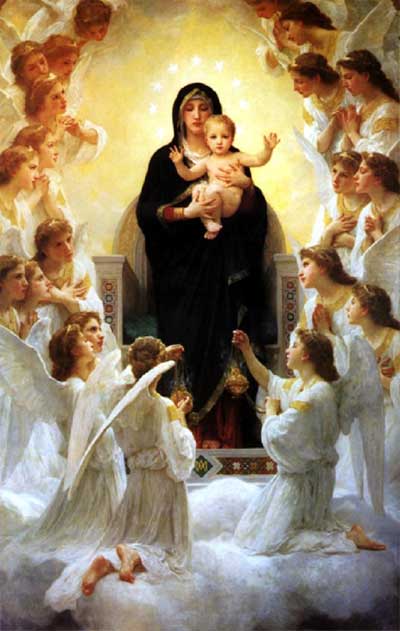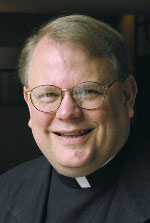[powerpress]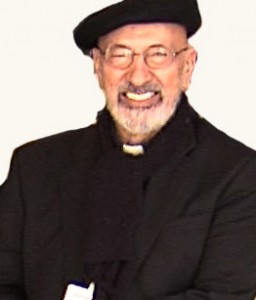
 Msgr. Esseff spoke at a recent conference which was held in PA. in November 2011. In the 3rd talk he speaks about sinfulness. Â Â Our mistaken notions and what we should know. What are the traps, what will free us. How confession can bring us into right order.
Msgr. Esseff spoke at a recent conference which was held in PA. in November 2011. In the 3rd talk he speaks about sinfulness. Â Â Our mistaken notions and what we should know. What are the traps, what will free us. How confession can bring us into right order.
Be sure to visit Msgr. Esseff’s website: Â Building A Kingdom of Love
Tags: catholic, catholic podcast, catholic prayer, cathollc spirituality, Esseff, forgiveness, John Esseff, mistaken notions, msgr. john esseff, sin, truth
This entry was posted on Wednesday, December 14th, 2011 at 10:28 am
You can follow any responses to this entry through the RSS 2.0 feed.
VATICAN CITY, 14 DEC 2011 (VIS) –
In his general audience this morning, the Holy Father dedicated his catechesis to Jesus’ prayer in the context of His healing miracles, focusing particularly on the healing of the deaf man as narrated in the Gospel of St. Mark, and the raising of Lazarus.
The healing of the deaf man “demonstrates that the cures worked by Jesus were connected with the intensity of His relationships, both with others and with the Father”, the Pope said. “With a gesture the Lord touches the sick man’s ears and tongue; that is, the sites of his infirmity. … But the central point of the episode lies in the fact that Jesus, at the very moment He works the cure, directly seeks
His relationship with the Father”, by looking up to heaven. “The narrative shows, then, that human involvement with the sick man led Jesus into prayer. His unique relationship with the Father emerges once again, His identity as Only-begotten Son. In Him, through His person, the healing and beneficial action of God is made present among us”.
The raising of Lazarus also highlights this aspect of Jesus’ dual relationships, His concern for a suffering friend and His filial bond with the Father. “His sincere affection for His friend … is expressed by the fact that Jesus was deeply moved at the sight of the suffering of Martha and Mary, and of all Lazarus’ friends, and in His profoundly human tears as he approaches the grave”, the Pope explained. At the same time, Christ interprets His friend’s death “in relation to His own identity and mission, and the glorification awaiting Him. When He hears news of Lazarus sickness, He says: ‘this illness does not lead to death: rather it is for God’s glory, so that the Son of God may be glorified through it'”.
“The moment when Jesus prays directly to the Father before the tomb is the natural climax of the entire episode”. According to John the Evangelist “Jesus looked upward and said, Father I thank you for having heard me”. This phrase, Benedict XVI explained, “shows us that Jesus had not for a moment ceased His prayer for Lazarus’ life. That prayer was continuous, indeed it strengthened Jesus’ bond with His friend and, at the same time, confirmed His decision to remain in communion with the will of the Father, with His plan of love in which the sickness and death of Lazarus is the place in which the glory of God is made manifest”.
Trusting in God’s will
These episodes, said the Holy Father, help us to understand “that when we ask the Lord for something in prayer, we must not expect an immediate fulfilment of our requests, of our will; rather, we should entrust outsides to the will of the Father, reading events in the perspective of His glory, of His plan of love which is often a mystery to our eyes. Thus in our prayer, request, praise and thanksgiving should fuse together, even when it seems to us that God does not respond to our expectations. Abandoning ourselves to the love of God, which always precedes and accompanies us, is a fundamental principle in our dialogue with Him. … Beyond anything that God may give us when we invoke Him, the greatest gift He can give us is His friendship, His presence, His love”. The
giver is more precious than the gift.
“The concern Jesus, true God and true man, feels for others, especially the needy and suffering, … causes Him to turn to the Father. … But the opposite is also true: communion with the Father, constant dialogue with Him, causes Jesus to be attentive to the real-life situations of man, to which He brings the consolation and love of God”.
This profound bond between love for God and love for others must, the Pope concluded, also be part of our own prayers, which “open the door to God, teaching us how to abandon our own selves in order to come close to others, especially in moments of trial, bringing them consolation, hope and light”.
At the end of his catechesis the Holy Father spoke in various languages to greet the more than 7,000 pilgrims gathered in the Paul VI Hall. He expressed his particular appreciation to the people who had contributed to the restoration of the sculpture of “The Resurrection” by Pericle Fazzini, which adorns the Hall. “Following a period of painstaking efforts”, he said, “today we have the joy of being able to admire this work of art and faith in all its original splendour”.
Speaking then in Spanish, Benedict XVI addressed a delegation from the Mexican state of Puebla, expressing the hope that, “with God’s help, I will soon be able to visit you in your country”.
Tags: catholic, catholic podcast, catholic prayer, cathollc spirituality, pope benedict xvi, prayer
This entry was posted on Wednesday, December 14th, 2011 at 7:42 am
You can follow any responses to this entry through the RSS 2.0 feed.
“The blind receive their sight and the poor have good news preached to them”
[powerpress = “daily-scripture”]
an excerpt from today’s reflection by Don Schwager: 
Jesus makes his point clear: Good intentions are not enough. And promises don’t count unless they are performed. God wants to change our hearts so that we will show by our actions that we respect his will and do it. God offers each of us the greatest treasure possible – unending peace, joy, happiness, and life with him in his kingdom. We can lose that treasure if we refuse the grace God offers us to follow in his way of truth, love, and righteousness. Jesus encourages us to think – to think about the consequences of our choices, especially the choices and decisions that will count not just for now but for eternity as well. The choices we make now will affect and shape our future, both our future on earth as well as in the life of the age to come. Are you ready to obey your heavenly Father and to choose for his kingdom of righteousness and peace?
“Lord Jesus, change my heart that I may desire to do whatever is pleasing to you. Help me to respect your will and give me the strength, joy, and perseverance to carry it out wholeheartedly.”
for the full reflection visit : Daily Reading and Meditation
Tags: advent, catholic, catholic podcast, catholic prayer, cathollc spirituality, don schwager, gospel of luke
This entry was posted on Wednesday, December 14th, 2011 at 12:04 am
You can follow any responses to this entry through the RSS 2.0 feed.
“The baptism of John, whence was it? From heaven or from men?”
[powerpress = “Daily-Scripture”]
an excerpt from today’s reflection by Don Schwager:
When the prophet John the Baptist began to preach a message of repentance in preparation for the coming of the Messiah, the religious leaders and rulers in Palestine resisted his word and persecuted him as well. Jesus met resistance, opposition, and fierce hostility from the religious rulers as well. Why did the religious leaders oppose Jesus and reject his claim to divine authority? Their view of religion did not match with God’s word because their hearts were set on personal gain rather than truth and submission to God’s plan and design for their lives. They openly questioned Jesus to discredit his claim to be the Messiah. If Jesus says his authority is divine they will charge him with blasphemy. If he has done this on his own authority they might well arrest him as a mad zealot before he could do more damage. Jesus, seeing through their trap, poses a question to them and makes their answer a condition for his answer. Did they accept the work of John the Baptist as divine or human? If they accepted John’s work as divine, they would be compelled to accept Jesus as the Messiah. They dodged the question because they were unwilling to face the truth. They did not accept the Baptist and they would not accept Jesus as their Messiah.
The coming of God’s kingdom or reign on the earth inevitably leads to conflict – a conflict of allegiance to God’s will or my will, God’s justice or the world’s way of playing fair, God’s standard of absolute moral truth or truth relative to what I want to believe is good and useful for the time being. How do you respond to Jesus’ claim to be not only the Messiah, but the source of everlasting life and truth as well? Do you submit to his word and stake your life on the coming of his kingdom? Jesus promises that those who seek to live according to God’s truth will find true joy, freedom, and happiness both now and forever.
“Lord Jesus Christ, you are the Way, the Truth, and the Life. Let your light shine in my heart and in my mind that I may grow in understanding the truth of your word and find joy and freedom in living according to it.”
for the full reflection visit : Daily Reading and Meditation
Tags: advent, catholic, catholic podcast, catholic prayer, cathollc spirituality, don schwager, gospel of matthew, john the baptist
This entry was posted on Monday, December 12th, 2011 at 12:05 am
You can follow any responses to this entry through the RSS 2.0 feed.
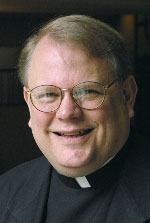
Monsignor James P. Moroney introduces to us the Collect for the Third Sunday of Advent (from the new English translation of the Roman Missal, Third Typical Edition).
The last part of the introductory rites is the Collect prayer, or what is commonly referred to as the opening prayer. In the early Church, this prayer probably served to gather the assembly for worship, but now it serves to collect or focus the assembly’s prayer at the beginning of the liturgy.
The Collect is a carefully constructed prayer and can be broken down into several parts: the priest’s invitation to prayer, “Let us pray;” a brief period of silence for private prayer and recalling one’s own intention; the prayer itself (containing praise of God, a petition, and the hoped outcome for the petition); a concluding doxology, “Through Christ our Lord;” and the people’s response, “Amen.”
All of the Collect prayers have been retranslated in a way that more accurately captures their original structure and meaning in Latin. Obviously, some of the literary devices such as rhyme and word play, among others, will not shine through as they do in the Latin, and some of the sentences are long and complex. However, the words matter; the words articulate the truths of the Christian faith. The words shape and form us as a believing community, and the words contribute to the unity of the Church across the world.
Tags: catholic, catholic podcast, catholic prayer, cathollc spirituality, third sunday of advent
This entry was posted on Sunday, December 11th, 2011 at 6:34 am
You can follow any responses to this entry through the RSS 2.0 feed.
Mark Hart is an author, speaker, director and  teacher, Mark’s work both written and spoken, is known across the country and world. While he serves as the Vice President of LIFE TEEN, he is known to tens of thousands simply as the “Bible Geek ®†Mark passionately echoes the gospel to all he encounters. He is as deep as he is funny, and his love for his wife and daughters is second only to his immense love for Jesus Christ.
teacher, Mark’s work both written and spoken, is known across the country and world. While he serves as the Vice President of LIFE TEEN, he is known to tens of thousands simply as the “Bible Geek ®†Mark passionately echoes the gospel to all he encounters. He is as deep as he is funny, and his love for his wife and daughters is second only to his immense love for Jesus Christ.
Tags: Advent Mark Hart, catholic, catholic podcast, catholic prayer, cathollc spirituality, lifeteen, mark hart, third sunday advent
This entry was posted on Saturday, December 10th, 2011 at 6:23 am
You can follow any responses to this entry through the RSS 2.0 feed.
[powerpress = “Vatican-Radio”]
 Pope Benedict XVI heard the second in a series of sermons dedicated to the theme of the New Evangelization. After singing the ancient Advent hymn, Rorate coeli, Capuchin Father Raniero Cantalamessa delivered a 5-part discourse centered on the history of the Church’s preaching of the Gospel, beginning with the great re-thinking of the relationship between the pilgrim Church on Earth to the secular authority accomplished by St Augustine of Hippo, and leading through the great periods of evangelization – and in some cases re-evangelization – of the peoples of Europe in the wake of the collapse of the Roman Empire in the West, before turning to the magnificent renewal of learning and missionary zeal – concentrating on the creation and development of monasticism, which itself ran through the dark centuries after the fall of the West and made possible the magnificent achievements of the High Middle Ages.
Then, Fr. Cantalamessa turned to the present, reflecting on the relationship between Mission and Contemplation, saying, “It is not enough that there be in the Church those who dedicate themselves to contemplation and those who dedicate themselves to mission: there must rather be a synthesis of the two things in the very life of every missionary.â€
Fr. Cantalamessa concluded his reflections on a Marian note, saying,
“Mary is the Star of Evangelization, for she brought the Word, not to this or that people, but to the whole world,â€
and noting that she did so by carrying the Word in her womb – not in her mouth or on her lips. “She was filled,†he said, “even physically, with Christ – and she radiated Him with her very presence
Tags: catholic, catholic podcast, catholic prayer, cathollc spirituality, contemplation, mission, vatican radio
This entry was posted on Saturday, December 10th, 2011 at 6:03 am
You can follow any responses to this entry through the RSS 2.0 feed.
Episode 6- Communion with Christ – Practical Prayer – How we receive prayer.  The reception of grace and the great gift of memory. “Ask…seek…knock “.  Through prayer, heaven begins. Prayer is a battle…it isn’t easy.  Western culture is a “culture of distraction”.  We need to receive the coming of God when it enlights upon us.
How we receive prayer.  The reception of grace and the great gift of memory. “Ask…seek…knock “.  Through prayer, heaven begins. Prayer is a battle…it isn’t easy.  Western culture is a “culture of distraction”.  We need to receive the coming of God when it enlights upon us.
[powerpress]
Deacon James Keating, PhD, the director of Theological Formation for the Institute for Priestly Formation, located at Creighton University, in Omaha.
 From the Catechism of the Catholic Church paragraph 2610and 2611
From the Catechism of the Catholic Church paragraph 2610and 2611
2610 Just as Jesus prays to the Father and gives thanks before receiving his gifts, so he teaches us filial boldness: “Whatever you ask in prayer, believe that you receive it, and you will.”66Â Such is the power of prayer and of faith that does not doubt: “all things are possible to him who believes.”67Â Jesus is as saddened by the “lack of faith” of his own neighbors and the “little faith” of his own disciples68Â as he is struck with admiration at the great faith of the Roman centurion and the Canaanite woman.69
2611 The prayer of faith consists not only in saying “Lord, Lord,” but in disposing the heart to do the will of the Father.70Â Jesus calls his disciples to bring into their prayer this concern for cooperating with the divine plan.71
2612 In Jesus “the Kingdom of God is at hand.”72Â He calls his hearers to conversion and faith, but also to watchfulness. In prayer the disciple keeps watch, attentive to Him Who Is and Him Who Comes, in memory of his first coming in the lowliness of the flesh, and in the hope of his second coming in glory.73Â In communion with their Master, the disciples’ prayer is a battle; only by keeping watch in prayer can one avoid falling into temptation.74
For more information on the “Institute of Priestly Formation†and for other material available by Deacon Keating, just click here
Don’t forget to pickup a copy of “Communion with Christ†, it is one of the best audio sets on prayer…ever!
Check out Deacon Keating’s “Discerning Heart†page
Tags: catholic, catholic podcast, catholic prayer, cathollc spirituality, creighton university, Deacon James Keating, Deacon Keating, institute for priestly formation, institute of priestly formation, james keating, prayer, theological formation
This entry was posted on Saturday, December 10th, 2011 at 1:43 am
You can follow any responses to this entry through the RSS 2.0 feed.
“He will save his people from their sins”
[powerpress = “daily-scripture”]
an excerpt from today’s reflection by Don Schwager: 
God gives signs to show what he is about to do. John the Baptist is one such sign, who pointed to Jesus and prepared the way for his coming. John fulfilled the essential task of all the prophets: to be fingers pointing to Christ. John is the last and greatest prophet of the old kingdom, the old covenant. The Jews expected that when the Messiah would come, Elijah would appear to announce his presence. John fills the role of Elijah and prepares the way for the coming of Christ by preaching a baptism of repentance and renewal. As watchful servants, we, too must prepare for the Lord’s coming again by turning away from sin and from everything that would keep us from pursuing his will. Are you eager to do God’s will and are you prepared to meet the Lord Jesus when he returns in glory?
“Lord Jesus, stir my zeal for your righteousness and for your kingdom. Free me from complacency and from compromising with the ways of sin and worldliness that I may be wholeheartedly devoted to you and to your kingdom.”
for the full reflection visit : Daily Reading and Meditation
Tags: catholic, catholic podcast, catholic prayer, cathollc spirituality, don schwager, gospel of matthew, Jesus, john the baptist
This entry was posted on Saturday, December 10th, 2011 at 12:05 am
You can follow any responses to this entry through the RSS 2.0 feed.
Episode 12 – Seeking Truth with Sharon Doran, hosted by Bruce McGregor. Â Ep 12 – The Blessed Virgin Mary, “The Head-Crushing” Immaculately Conceived Handmaid of the Lord
[powerpress]
Sharon Doran serves as the teaching director of “Seeking Truth.†An experienced Bible Study teacher, Sharon has a passion forscripture that will motivate and challenge you to immerse yourself in God’s Word and apply His message to your every day life.
 Episode 12 – Sharon and Bruce discuss the Blessed Virgin Mary. Â Mary is the new Eve! The sin-free woman who will crush the head of the serpent. Â Sharon breaks open Genesis chapter 2, the Gospel of Luke, Revelation 12 and the Old Testament teachings on the two other woman who are “blessed” and how this shines a light on our understanding of Mary!
Episode 12 – Sharon and Bruce discuss the Blessed Virgin Mary. Â Mary is the new Eve! The sin-free woman who will crush the head of the serpent. Â Sharon breaks open Genesis chapter 2, the Gospel of Luke, Revelation 12 and the Old Testament teachings on the two other woman who are “blessed” and how this shines a light on our understanding of Mary!
 “Seeking Truth†is an in depth Catholic Bible Study, commissioned by the Archdiocese of Omaha in response to John Paul II’s call to the New Evangelization as well as Pope Benedict XVI’s exhortation for all Catholics to study scripture. To learn more go to:www.seekingtruth.net
“Seeking Truth†is an in depth Catholic Bible Study, commissioned by the Archdiocese of Omaha in response to John Paul II’s call to the New Evangelization as well as Pope Benedict XVI’s exhortation for all Catholics to study scripture. To learn more go to:www.seekingtruth.net
Tags: blessed virgin mary, catholic, catholic podcast, catholic prayer, cathollc spirituality
This entry was posted on Friday, December 9th, 2011 at 9:18 am
You can follow any responses to this entry through the RSS 2.0 feed.
 Katie Davis is “just a normal girl who is trying to do what God has asked her to do”.  “Kisses from Katie: A story of relentless love and redemption” is written by 22 year old Katie, who went to mission for a “short” time in Uganda and found God had another plan.  Now she is the adopted mother of 13 girls and founder of  Amazima Ministries, which encourages orphaned and vulnerable children and the poor in the country of Uganda. In the Lugandan language, Amazima (uh-mahz-i-muh) means “truth.” Amazima desires to reveal the truth of God’s unconditional love through Jesus Christ to the Ugandan people.  Katie is remarkable and inspiring and a joy to read and talk with.  Please, say a prayer for her and her “kids” today.
Katie Davis is “just a normal girl who is trying to do what God has asked her to do”.  “Kisses from Katie: A story of relentless love and redemption” is written by 22 year old Katie, who went to mission for a “short” time in Uganda and found God had another plan.  Now she is the adopted mother of 13 girls and founder of  Amazima Ministries, which encourages orphaned and vulnerable children and the poor in the country of Uganda. In the Lugandan language, Amazima (uh-mahz-i-muh) means “truth.” Amazima desires to reveal the truth of God’s unconditional love through Jesus Christ to the Ugandan people.  Katie is remarkable and inspiring and a joy to read and talk with.  Please, say a prayer for her and her “kids” today.
[powerpress]
You can find the book here
Katie’s blog is here
Tags: catholic, catholic podcast, catholic prayer, cathollc spirituality, Katie Davis, love, truth, Uganda
This entry was posted on Friday, December 9th, 2011 at 8:57 am
You can follow any responses to this entry through the RSS 2.0 feed.
Will this generation heed God’s wisdom?
[powerpress=”daily-scripture”]
an excerpt from today’s reflection by Don Schwager:
Why did the message of John the Baptist and the message of Jesus meet with deaf ears and resistance? It was out of jealously and spiritual blindness that the scribes and Pharisees attributed John the Baptist’s austerities to the devil and they attributed Jesus’ table fellowship with sinners as evidence that he must be a false messiah. They succeeded in frustrating God’s plan for their lives because they had closed their hearts to the message of John the Baptist and now to Jesus’ message. What can make us spiritually dull and slow to hear God’s voice? Like the generation of Jesus’ time, our age is marked by indifference and contempt, especially in regards to the things of heaven. Indifference dulls our ears to God’s voice and to the good news of the gospel. Only the humble of heart can find joy and favor in God’s sight. Is you life in tune with Jesus’s message of hope and salvation? And do you know the joy of obedience to God word?
“Lord Jesus, open my ears to hear the good news of your kingdom and set my heart free to love and serve you joyfully. May nothing keep me from following you wholeheartedly.”
for the full reflection visit : Daily Reading and Meditation
Tags: catholic, catholic podcast, catholic prayer, cathollc spirituality, deaf ears, don schwager, gospel of matthew, john the baptist, scribes and pharisees, spiritual blindness
This entry was posted on Friday, December 9th, 2011 at 12:51 am
You can follow any responses to this entry through the RSS 2.0 feed.
Hail Holy Queen, Mother of mercy
[Hail] our life, our sweetness and our hope!
To thee do we cry, poor banished chidren of Eve,
To thee do we send up our sighs,
Mourning and weeping in this valley of tears.
Turn, then, o most gracious advocate,
Thine eyes of mercy and after this our exile
Show unto us the blessed fruit of thy womb, Jesus.
O clement, o loving, o sweet Virgin Mary.
 Â Latin text
 Latin text
Salve Regina, Mater Misericordiae,
Vita, dulcedo, et spes nostra, Salve!
Ad te clamamus, exsules filii [H]evae,
Ad te suspiramus, gementes et flentes,
In hac lacrimarum valle.
Eja ergo, Advocata nostra,
Illos tuos misericordes oculos ad nos converte
Et Jesum, benedictum fructum ventris tui,
Nobis, post hoc exilium, ostende,
O clemens, O pia, O dulcis Virgo Maria. (more…)
Tags: catholic, catholic podcast, catholic prayer, cathollc spirituality, English translation, French translation, hail holy queen, hymn, Jesus, mercy, prayer, salve regina, translation
This entry was posted on Wednesday, December 7th, 2011 at 9:41 pm
You can follow any responses to this entry through the RSS 2.0 feed.
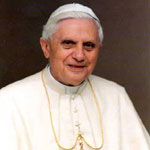 VATICAN CITY, 7 DEC 2911 (VIS) –
VATICAN CITY, 7 DEC 2911 (VIS) –
Benedict XVI dedicated the catechesis of today’s Wednesday audience, celebrated in the Vatican’s Paul VI Hall, to the Messianic Hymn of Jubilee, Jesus’ prayer of praise recorded in the Gospels of Matthew and Luke, which constitutes the “apex of a path of prayer in which Jesus’ profound and intimate communion with the Father in the Holy Spirit and His divine filiation clearly emerges “.
Already at the opening of the hymn, the Pope observed, Jesus addresses God by calling him Father, a term that expresses “Jesus’ awareness and certainty of being ‘the Son’ in close and constant communion with Him. This is the central point and the source of Jesus’ every prayer. … The name of ‘Father’ is followed by a second title: ‘Lord of heaven and earth'”, which “recalls the great biblical narration of the history of God’s love for human beings that began with creation. Jesus … is the pinnacle and the fullness of this history of love. … Through the expression ‘Lord of heaven and earth’ we also recognize how, in Jesus, the one who reveals the Father, the possibility of access to God is opened to humanity”.
But, to whom does the Son want to reveal the mysteries of God? “Divine revelation”, the pontiff explained, “does not occur within earthly logic, according to which humans are the wise and powerful who posses important knowledge and transmit it to those who are more simple. … God’s
style is another: His communication is addressed precisely to the ‘childlike’. … And what is this childlikeness that opens humans to a filial intimacy with God and to welcoming His will? … It is the pureness of heart that allows us to recognize the face of God in Jesus Christ. It is keeping our hearts as simple as those of children, without the presumptions of those who are locked in themselves, thinking they have no need of anyone, not even God”.
“In Matthew’s Gospel, after the Hymn of Jubilee, we encounter one of Jesus’ most moving pleas: ‘Come to me, all you who labor and are burdened, and I will give you rest.’ Jesus asks that we go to Him, the true wisdom, to the one who is ‘meek and humble of heart’; He proposes His ‘yoke’, the path of evangelical wisdom, which is neither a doctrine to learn nor an ethical proposal, but rather a Person to follow: He himself, the only-begotten Son, in perfect communion with the Father”.
“We also can address God with the confidence of sons and daughters”, Benedict XVI concluded, “calling Him Father when we pray. But we have to keep the heart of a child, the heart of those ‘poor in spirit’, in order to recognize that we are not self-sufficient … that we need God, that we have to seek Him, listen to Him, speak to Him. Prayer opens us to receiving the gift of God, His wisdom who is Jesus himself, in order to accept the will of the Father in our lives and to find consolation in the weariness of our journey”.
At the end of the audience, Benedict XVI greeted the pilgrims present in the hall in their various languages and noted that the Solemnity of the Immaculate Conception, which is celebrated tomorrow, “reminds us of Mary’s singular acceptance of God’s salvific plan. Preserved from any stain of sin in order to be the holy dwelling place of the Incarnate Word, she always trusted fully in the Lord”. The Pope especially urged the youth to make the effort to imitate the Virgin “with pure and clean hearts, letting yourselves be shaped by God who, in you as well, desires to bring about ‘great things'”.
Tags: catholic, catholic podcast, catholic prayer, cathollc spirituality, pope benedict xvi, prayer
This entry was posted on Wednesday, December 7th, 2011 at 9:13 am
You can follow any responses to this entry through the RSS 2.0 feed.
The New and Eternal Word, Monsignor James P. Moroney explores how the Church celebrates the Holy Mass in our day. In particular, he examines how a new Missale Romanum and a new English translation of these prayers can draw us more deeply into the words and rites of the Mass.
Tags: catholic, catholic podcast, catholic prayer, cathollc spirituality, eternal word, Monsignor James P. Moroney, Msgr. James P. Moroney, new mass translation
This entry was posted on Wednesday, December 7th, 2011 at 12:19 am
You can follow any responses to this entry through the RSS 2.0 feed.




